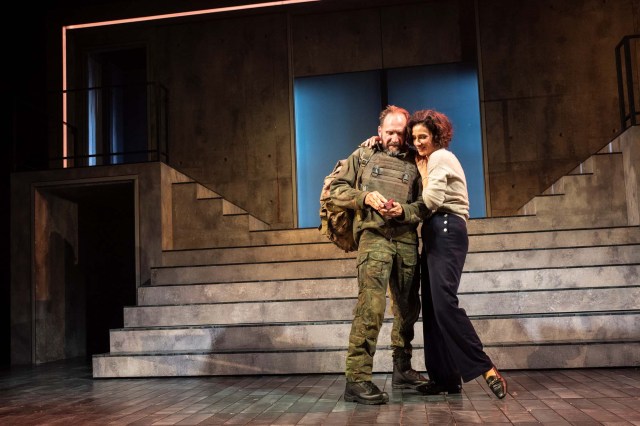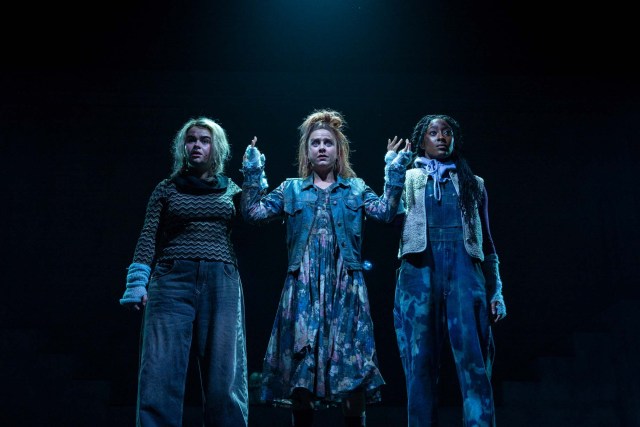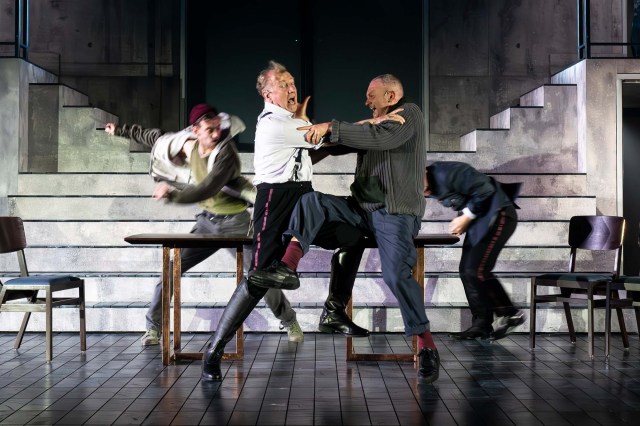Macbeth review – Ralph Fiennes and Indira Varma are a killer couple
The production tours spaces in Edinburgh, Liverpool and London

It’s the season of Macbeths. Shakespeare’s swiftest and most gory tragedy has already been seen at the RSC, and David Tennant and Cush Jumbo will offer their version at the Donmar before Christmas. But first, at the start of a British and American tour, come Ralph Fiennes and Indira Varma as the social climbing couple who resort to murder to take to the throne.
They set the bar high. Directed by Simon Godwin, this is a fascinating, intelligent production, a study of tyranny and the way it corrupts the soul – and a portrait of a relationship smashed apart by a single reckless act.
It’s being performed in warehouses rather than conventional theatres, and designer Frankie Bradshaw frames the narrative with a shattered landscape. A blazing car, rubble and unsmiling soldiers on patrol surround the space. Christopher Shutt’s soundscape mingles the roar of fighter jets with the haunting sounds of a child’s music box.
It’s noisily atmospheric yet once the story proper begins on the stage – winged with battered metal shutters, and with a glass door at the top of a shallow staircase – the most notable quality of the production is its clarity – and its ability to let meaning arise from the words and the spaces between them.

The witches (Lucy Mangan, Danielle Fiamanya, Lola Shalam) are eerie but everyday, conversationally frightening, quietly embedded in the action. Emily Burns’s light but decisive adaptation cuts their curses and moves them to unfamiliar places. They cast spells over the murder of Banquo and conjure spirits through the henchmen that Macbeth surrounds himself with. They may be supernatural, but they are part of life.
When they first encounter Fiennes’s Macbeth it is his reaction that is extraordinary. Grey-bearded and slightly hunched, like an eagle eyeing its prey, his ambition seems coiled within him, ready to explode at their predictions. When Duncan nominates Malcolm his heir, he looks away, blowing out his cheeks, his jaw working.

In these early scenes Fiennes, who previously collaborated with Godwin on Antony and Cleopatra, draws the audience into complicity, tracing the arc of his vaulting ambition with collusive ease. He has reached the point where he seems to live inside Shakespeare’s language, arriving at meaning as naturally as he breathes. His intonation feels alive; when he lends the word murder gentle emphasis, he is letting you into his thoughts.
When Varma’s Lady M appears, in elegant jumper and trousers, looking for all the world like an aristocratic wife, she has the same vital way of bringing familiar speeches to new life, the same way of appearing to embrace the audience. She is positively giddy at the thought of killing the king, smiling with glamorous glee as she plots. Fiennes falls to his knees and embraces her womb in admiration of her courage and resolve. His “bring forth men children only” makes a look of sorrow pass across her face, as if she knows she cannot.
The compelling dynamics of this tortured relationship drive the early part of the play. As Macbeth becomes more seeped in blood, she literally pulls away, withholding her body and her approval. As she fades from the action, it becomes less compelling, yet Fiennes continues to chart Macbeth’s decline into a man who has become one-dimensional. His charm, the easy bonhomie seeps away, and he is left as a tyrannical, sitting still in a chair, contemplating death with empty resolution but without animating complexity.
It is Godwin’s achievement in a play that is essentially about action to weave in long moments of stillness. The banqueting scene is beautifully staged, the guests forming a tableau of horror as Macbeth is transfixed by Banquo’s ghost who, like the witches, simply walks on. At its close, Varma’s quiet suggestion that “your lack the season of all natures, sleep” provokes the last moment of tenderness between them, as they cling together in despair. Later, Macduff (a fine Ben Turner) absorbs the news of his children’s slaying with icy sadness.
Yet the pace never slackens. The battle scenes are spectacular, with real tree branches, pyrotechnics, and fierce fighting staged by Kate Waters. Asaf Zohar’s music underlines the changing moods. The whole thing is confident and engrossing, full of both dramatic sweep, and thoughtful detail, a production that asserts the play’s power.












